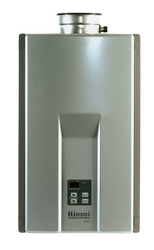Mar 10 2009
Rinnai is pleased to announce that its tankless water heaters and direct-vent wall furnaces are now more accessible to consumers thanks to the launch of the Rinnai leasing programs, which are designed to encourage the use of tankless or direct-vent heating technology among consumers that want to enjoy the comforts and conveniences of continuous hot water or energy-efficient home heating but may be reluctant to invest in new home appliances due to the current economic state.
 Rinnai's R94LSi tankless water heater
Rinnai's R94LSi tankless water heater
Another option for consumers is to save money on Rinnai's ENERGY STAR® qualified tankless water heaters with the recent federal tax credits contained in the American Recovery and Reinvestment Act of 2009 (commonly known as the Stimulus bill). To promote these opportunities, Rinnai is embarking on a multi-tiered marketing campaign that includes national print advertising, public relations and dealer communications aimed at educating consumers about the programs.
"In tough economic times, consumers often postpone large home purchases to save money, and while this action is understandable, we believe homeowners shouldn't have to compromise on their hot water needs or personal comfort in order to live conservatively," said Phil Weeks, general manager of Rinnai America Corporation. "Our leasing programs, as well as the new tax incentives, make Rinnai technology available to more consumers than ever before by lessening the financial burden of installing a Rinnai appliance."
Rinnai Leasing Programs
Rinnai has an agreement with AWHR, one of the nation's leading appliance leasing companies, to introduce the Rinnai tankless water heater and direct-vent wall furnace leasing programs to the U.S. market. The programs allow consumers to experience the benefits of Rinnai technology without the upfront costs associated with the purchase and installation of new appliances. Under the 60-month leasing agreement, AWHR would own the customer's Rinnai unit and would pay all installation and maintenance costs, while the homeowner pays AWHR a low monthly fee for the duration of the contract.
"We are aware that some homeowners may not feel comfortable investing in the purchase and installation of a Rinnai tankless water heater or direct-vent wall furnace right now," said Weeks. "Our leasing programs enable consumers to experience the lifestyle benefits of Rinnai technology for as low as $45 per month, allowing a customer more financial flexibility."
The monthly cost to lease a Rinnai tankless water heater or direct-vent wall furnace is dependent on several factors including the installation location and gas line, therefore a Rinnai authorized service provider or registered installer must conduct an installation inspection of the home prior to quoting the exact cost. At the end of the 60-month period, the homeowner may choose to continue their lease at a reduced rate or to purchase their Rinnai appliance. The lease is transferable should the homeowner decide to sell the home; however, the original customer must complete the payments remaining on the contract if the new property owner does not want to continue the lease.
Consumers interested in participating in the Rinnai leasing programs should call AWHR at 866-246-AWHR or visit www.AWHR.com to arrange for an installation inspection.
Federal Tax Credits
Consumers may save money on the purchase and installation of a Rinnai tankless unit with the applicable tax incentives outlined in the recently passed Stimulus bill, which extend the existing tax credit for energy-efficient tankless water heaters through 2010 and increase it from $300 to 30 percent of the full purchase and installation price of the unit up to a maximum of $1,500. According to the bill, whole-home gas tankless water heaters must have an energy factor (EF) of at least 0.82 or greater, making the tax credit applicable to all ENERGY STAR qualified Rinnai tankless units. In addition, the bill stipulates that the tax credit for energy-efficient home improvements pertains only to existing homes that serve as a consumer's primary residence. Unlike a tax deduction, which lowers an individual's taxable income, a tax credit reduces the tax paid dollar-for-dollar and therefore generally is more valuable.
In order to claim the tax credit, consumers must purchase and install a qualifying Rinnai tankless water heater between Jan. 1, 2009 and Dec. 31, 2010, saving the proof of purchase and a copy of the Rinnai Manufacturer's Certification Statement. They should then simply file IRS Form 5695 with their 2009 or 2010 taxes. Consumers may consult a tax professional for further details or guidance.